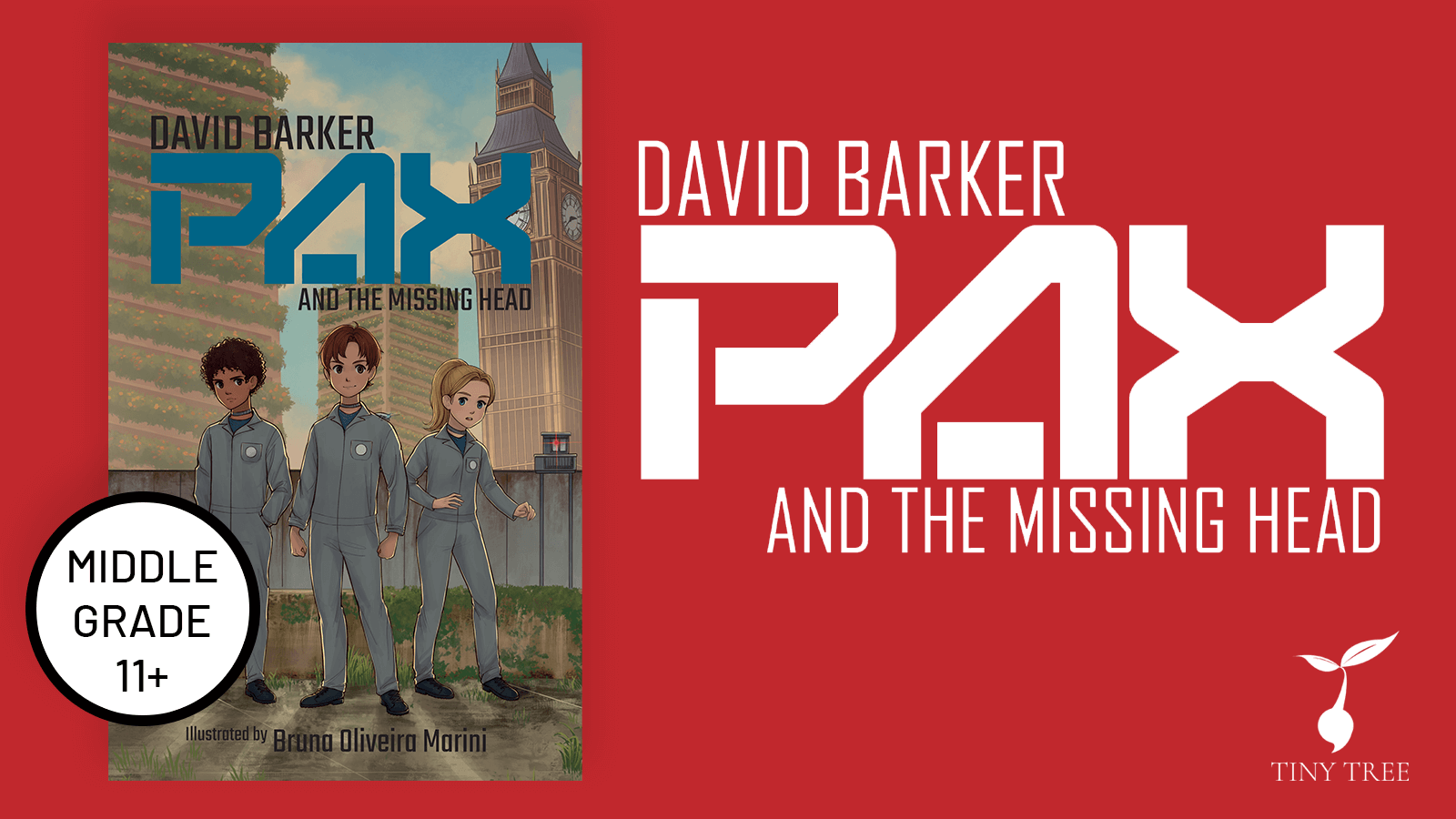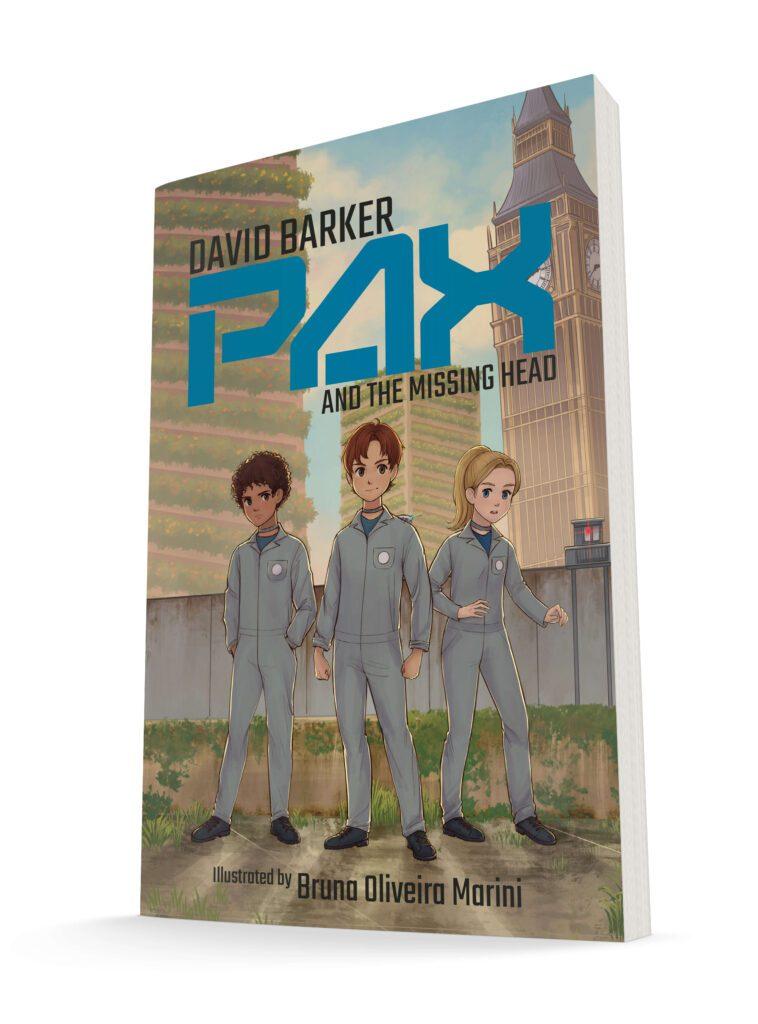
A middle-grade sci-fi book isn’t all that uncommon, but the dystopian London setting found in Pax and the Missing Head — New London — is far, far, different from the English capital you may be familiar with.
In this exclusive Q&A, we chat with David Barker and discover how middle-grade sci-fi novels, The A-Team, Orwell’s 1984, Harry Potter, and Brexit all inspired the author to write what has become Pax and The Missing Head; the opening chapter of his ‘London Falling’ series. David also gives us a peek ‘behind the wall’, discussing the next two books in his ‘London Falling’ trilogy, his publication day plans, and much more.
“I began to wonder: ‘What if these divisions led to another civil war in Britain?'”
Pax and the Missing Head is the first book in your ‘London Falling’ trilogy. How long have you wanted to write a middle-grade sci-fi-inspired adventure like this?
I’ve always loved reading sci-fi novels, and it turns out I love writing them too! I started working on Pax back in 2018, around the time my trilogy of climate fiction thrillers set during a future world war for water came out (The Gaia Trilogy, Bloodhound Books). Those books had large elements of near-future technology and socio-economic changes in them and it felt like the right sort of setting for my story about a boy called Pax.
Speaking of Pax, without giving too much away, what can you tell us about Pax and the journey he’s on in this book?
Pax is a product of the Artificial Birth Youth Service Scheme (ABYSS for short). The first boy born of the ABYSS in 2045, he is given the seri-name 45B1 and assigned to Workhouse Five. He toils on the verti-farms that help feed the citizens of New London. But an unfortunate accident leads to ‘ratting duty’ – a spell in the sewers – as punishment. Things go from bad to worse for Pax as his commandant takes a disliking to him, and soon the only way out of this terrible fate is to apply for Scholastic Parliament where the rewards are great, but so too are the risks.
We know Pax is a bit of a technology whizz and loves to craft new things out of old hardware. Was there anyone in particular who inspired this side of the character?
Not specifically, but I always enjoyed those moments in The A-Team or MacGyver when the hero would turn a heap of junk into something useful to defeat the baddie at the end of every program. Pax is a bit of a nerd compared with the other kids in Workhouse Five, so it seemed fitting that he would be the resident expert at tech/coding, etc.
‘New London’ serves as a character in itself. What motivated you to write a middle-grade sci-fi story set in a dystopian version of London?
As I said earlier, I started working on this book in 2018. It was inspired (if that’s the right word!) by the deep political divisions in this country and in America following the Brexit vote and Trump’s election win. I began to wonder: ‘what if these divisions led to another civil war in Britain?’ Pax & The Missing Head is set at a time when the initial fighting has died down and New London shelters behind a giant wall. My vision for this future borrowed heavily from my memories of George Orwell’s 1984. The final piece of the jigsaw fell into place when my enjoyment of Harry Potter fused with my interest in the Palace of Westminster and I wondered: what if this building became a school? Scholastic Parliament was born.

We can see from the book’s cover that Big Ben is still standing, but are there any other landmarks people may notice if they’re familiar with London?
Aside from The Wall, which Pax visits on a school trip, the reader doesn’t get to see much of New London in Book One – the action is centered inside Scholastic Parliament. From the top of his verti-farm Pax can see the crumbling old BT tower – though he only knows it as the ‘Beattie’ tower. There will be a lot more action outside school in Book Two when readers will find out what’s happened to the Tower of London, the London Eye, and various other monuments.
World-building plays a huge role in Pax and the Missing Head. How did it feel when you first let your characters loose? Did the world inform the direction the characters took, or did the characters define the world as you were writing?
It was a lot of fun letting them loose on this dark vision, although often not fun for the characters! The world definitely shaped Pax’s outlook on his life and ambitions – he is desperate to join The Worshipful Company of Engineers – while abhorring conflict. The Guild of Cities was formed to create a utopian society of equals but as with all such attempts, some members of society quickly figure out how to be more equal than others. It is this inherent bias in the system that Pax and his friends must fight against.
“I was hoping to write a story that could bridge the gap between middle-grade and YA books.”
Pax may be a middle-grade sci-fi story, but we firmly believe that this is a book that could be enjoyed by readers of any age. Was this deliberate? If so, how did you balance between catering to your target audience (11+) and older readers?
Yes, I’m glad you think so. I wanted to give the story some depth so that the socio-economic setting might trigger a debate for older readers, while younger readers could happily let this slide and just enjoy the adventure. Like a certain series about a famous wizarding school, I was hoping to write a story that could bridge the gap between middle-grade and YA books.
Is there any specific message that you hope readers will take from Pax and the Missing Head?
Teamwork makes the dream work. And be nice to each other. Social media seems to polarize people’s views and makes them less likely to engage in proper debate and listen to both sides of the argument. With the many troubles our world now faces, I believe we need more grown-up dialogue, not less.
We can’t wait for readers to get their hands on Pax and the Missing Head, but what has it been like for you getting some early feedback from the likes of Kieran Larwood?
“Pax is a great character in a brilliant dystopian adventure.”
Kieran Larwood (award-winning author of The World of Podkin One-Ear)
That was amazing! It has completely made my year 😊 Especially because I am such a massive fan of Kieran’s wonderful stories about Podkin and Uki amongst others.
Pax and the Missing Head is published on October 19th, but is there anything you want to let people in on before that date? Anything for the future books perhaps?
Book Two is finished (though it still needs a good edit) and I can promise plenty of action, a wider horizon, and some big surprises. The broad outline for Book Three is also done and readers are going to see even more of this dark vision of Britain.
Finally, what are your plans around the launch of the book and where can people find you?
I’m holding an online launch party, hosted by the wonderful Heather at Reading Rocks, which people can sign up for here: https://forms.gle/T8qg97vjKjKAMRcv6
I’m also doing a school visit (to my daughter’s old school) on the launch day itself and I have a couple of public events coming up at the end of October which I’ll shout about nearer the time.

Pax and the Missing Head is a middle-grade sci-fi novel set in London — a version of London unlike any you have ever seen. Written by David Barker, this dystopian sci-fi adventure is available from all good bookshops.

